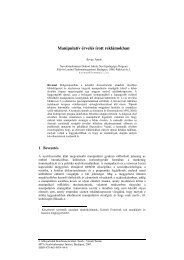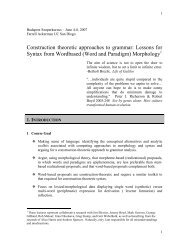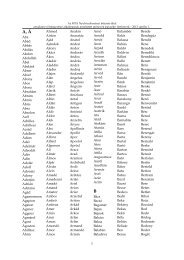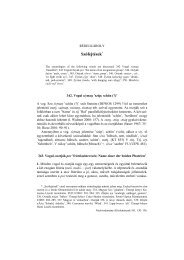- Page 1 and 2: LXV. kötet NYELVTUDOMÁNYI KÖZLEM
- Page 3 and 4: • NYELVTUDOMÁNYI KÖZLEMÉNYEK A
- Page 5 and 6: A jelöletlenség mint az urál-alt
- Page 7 and 8: A JELÖLETLENSÉG} AZ URÁL-ALTAJI
- Page 9 and 10: A JELÖLETLENSÉG AZ URÁL-ALTAJI N
- Page 11 and 12: A,JELÖLETLENSÉG AZ URÁL-ALTÁJI
- Page 13 and 14: A JELÖLETLENSÉG AZ ÜRÁL-ALTAJI
- Page 15 and 16: A JELÖLETLENSÉG AZ URÁL-ALTAJI N
- Page 17: A JELÖLETLENSÉG AZ URÁL-ALTAJT N
- Page 21 and 22: A JELÖLETLENSÉG AZ UBÁL-ALTAJI N
- Page 23 and 24: A JELÖLETLENSÉG AZ URÁL-ALTAJI N
- Page 25 and 26: A JELÖLETLENSÉG AZ URAL-ALTAJI NY
- Page 27 and 28: A JELÖLETLENSÉG AZ UEÁL-ALTAJI N
- Page 29 and 30: A JELÖLETLENSÉG AZ URÁL-ALTAJI N
- Page 31 and 32: A JELÖLETLENSÉG AZ ÜRÄL-ALTAJI
- Page 33 and 34: A JELÖLETLENSÉG AZ UEÁL-ALTAJI N
- Page 35 and 36: A JELÖLETLENSÉG AZ URÁL-ALTAJT N
- Page 37 and 38: A JEIÖIÉTIENSÉG AZ YHÂI-AITAJI
- Page 39 and 40: A JELÖLETLENSÉG AZ ÜBÁL-ALTAJI
- Page 41 and 42: A JELCIETIEMÉG A'l UIîil-^ITAJl N
- Page 43 and 44: A JELÖLETLENSÉG AZ URÁL-ALTÁJI
- Page 45 and 46: A JELÖLETLENSÉG AZ UE ÁL-ALT A J
- Page 47 and 48: A JELÖLETLENSÉG AZ TJE.ÁL-ALTÁJ
- Page 49 and 50: A JELÖLETLENSÉG AZ URÁL-ALTAJI N
- Page 51 and 52: Cseremisz szövegmutatványok Az al
- Page 53 and 54: CSEREMISZ SZÖVEGMUTATVÁNYOK 51 A
- Page 55 and 56: CSEREMISZ SZÖVEGMUTATVÁNYOK 53 jw
- Page 57 and 58: CSEREMISZ SZÖVEGMUTATVÁNYOK 55 mo
- Page 59 and 60: CSEREMISZ SZÖVEGMUTATVÁNYOK 57 wz
- Page 61 and 62: CSEREMISZ SZÖVEGMÜTATVÁNYOK 59 f
- Page 63 and 64: CSEREMISZ SZÜVEGMUTATVÁNYOK 61 ti
- Page 65 and 66: CSEKEMÎSZ SZÖVEGMÜTATVÁÍTYOK 6
- Page 67 and 68: CSEREMISZ SZÜVEGMÜTATVÁNTOK 65
- Page 69 and 70:
CSEBEMISZ SZÖVEGMUTATVÁNYOK 67 j
- Page 71 and 72:
CSEREMISZ SZÖVEGMUTATVÁNYOK 69 16
- Page 73 and 74:
CSEREMISZ SZÖVEGMUTATVÁNYOK 71 í
- Page 75 and 76:
CSEREMISZ SZÖVüKiMOTATVÁNYOK 73
- Page 77 and 78:
CSEREMISZ SZÖVEGMUTATVÁNYOK 75 28
- Page 79 and 80:
Szláv jövevényszavaink magánhan
- Page 81 and 82:
SZLÁV JÖVEVÉNYSZAVAINK MAGÁNHAN
- Page 83 and 84:
SZLÁV JÖVEVÉNYSZAVAINK MAGÁNHAN
- Page 85 and 86:
SZLÁV JÖVEVÉNYSZAVAINK MAGÁNHAN
- Page 87 and 88:
SZLÁV JÖVEVÉNYSZAVAINK MAGÁNHAN
- Page 89 and 90:
-Y SZLÁV JÖVEVÉNYSZAVAINK MAGÁN
- Page 91 and 92:
SZLÁV JÖVEVÉNYSZAVAINK MAGÁNHAN
- Page 93 and 94:
' SZLÁV JÖVEVÉNYSZAVAINK MAGÁNH
- Page 95 and 96:
SZLÁV JÖVEVÉNYSZAVAINK MAGÁNHAN
- Page 97 and 98:
SZLÁV JÖVEVÉNYSZAVAINK MAGÁNHAN
- Page 99 and 100:
SZLÁV JÖVEVÉNYSZAVAINK MAGÁNHAN
- Page 101 and 102:
SZLÁV JÖVEVÉNYSZAVAINK MAGÁNHAN
- Page 103:
SZLÁV JÖVEVÉNYSZAVAINK MAGÁNHAN
- Page 106 and 107:
104 FÓNAGY IVÁN—MAGDICS KLÁRA
- Page 108 and 109:
,*• 106 FÓNAGY IVÁN—MAGDICS K
- Page 110 and 111:
103 FÓNAGY IVÁN—MAGDICS KLÁRA
- Page 112 and 113:
110 FÓNAGY IVÁN—MAGDICS KLÁRA
- Page 114 and 115:
112 FÓNAGY IVÁN—MAGDICS KLÁKA
- Page 116 and 117:
114 FÓNAGY IVÁN—MAGDICS KLÁRA
- Page 118 and 119:
116 FÓNAGY IVÁN—MAGDICS KLÁRA
- Page 120 and 121:
118 FÓNAGY IVÁN—MAGDICS KLÁRA
- Page 122 and 123:
120 FÓNAGY IVÁN—MAGDICS KLÁKA
- Page 124 and 125:
122 FÓNAGY IVÁN—MAGDICS KLÁRA
- Page 126 and 127:
124 FÓNAGY IVÁN—MAGDICS KLÁRA
- Page 128 and 129:
126 FÓNAGY IVÁN—MAGDICS KLÁRA
- Page 130 and 131:
128 FÓNAGY IVÁN—MAGDICS KLÁRA
- Page 132 and 133:
130 FŐNAGY IVÁN—MAGDICS KLÁRA
- Page 134 and 135:
132 FÓNAGY IVÁN—MAGDICS KLÁKA
- Page 136 and 137:
134 FÓNAGY IVÁN—MAGDICS KLÁRA
- Page 138 and 139:
136 FÓNAGY IVÁN—MAGDICS KLÁRA
- Page 140 and 141:
138 ERDÉLYI ISTVÁN zvuk r\, toso
- Page 142 and 143:
140 ERDÉLYI ISTVÁN 7. minek malas
- Page 144 and 145:
142 ERDÉLYI ISTVÁN Nem is nagyon
- Page 146 and 147:
144 ERDÉLYI ISTVÁN 8. A gyerekek
- Page 148 and 149:
A mari nyelv vetlugai nyelvjárás
- Page 150 and 151:
148 ERDŐDI JÓZSEF KR. kd'lmäs 'f
- Page 152 and 153:
! 150 ERDŐDI JÓZSEF Ez az a > ä
- Page 154 and 155:
152 EKDŐDI JÓZSEF Ámde a K. nyel
- Page 156 and 157:
154 ERDŐDI JÓZSEF 1. Mindössze k
- Page 158 and 159:
156 P:RDÖDI JÓZSEP UP.-ben ëb'ld
- Page 160 and 161:
158 RÉDEI KÁROLY származtatás e
- Page 162 and 163:
160 RÉDEI KÁROLY Bäume im Walde)
- Page 164 and 165:
162 E.ÉDBI KÁROLY STEINITZ, OstjV
- Page 166 and 167:
164 KÉDEI KÁROLY 7. Finn kulli 'S
- Page 168 and 169:
Az én személyes névmás eredeté
- Page 170 and 171:
168 RËDEI KÁROLY nyomósító sz
- Page 172 and 173:
Etimológiai jegyzetek* 1. Magyar f
- Page 174 and 175:
172 GULYA JÁNOS 2. A m. apadni sz
- Page 176 and 177:
174 GULYA JÁNOS viszont a k hangot
- Page 178 and 179:
176 BERECZKI GÁBOR A hegyi nyelvj
- Page 180 and 181:
ETIMOLÓGIAI MEGJEGYZÉSEK 177 irod
- Page 182 and 183:
A váj ige és az áj vi-, v§-, v
- Page 184 and 185:
182 K. PALLÓ MARGIT kétséget kiz
- Page 186 and 187:
184 K. PALLÓ MARGIT van még a fel
- Page 188 and 189:
186 FODOR ISTVÁN A szinkronikus é
- Page 190 and 191:
188 FODOR ISTVÁN H/a. altípus bol
- Page 192 and 193:
190 FODOR ISTVÁN A továbbiakban a
- Page 194 and 195:
192 FODOR ISTVÁN nem lehet feláll
- Page 196 and 197:
194 ISMERTETÉSEK — SZEMLE Toivo
- Page 198 and 199:
196 ISMERTETÉSEK — SZEMLE Megeml
- Page 200 and 201:
198 ISMERTETÉSEK — SZEMLE közl
- Page 202 and 203:
200 ISMERTETÉSEK — SZEMLE fogalm
- Page 204 and 205:
202 ISMERTETÉSEK — SZEMLE A nyel
- Page 206 and 207:
204 ISMERTETÉSEK — SZEMLE sadalm
- Page 208 and 209:
206 ISMERTETÉSEK — SZEMLE a köz
- Page 210 and 211:
208 ISMERTETÉSEK — SZEMLE Nincse
- Page 212 and 213:
210 ISMERTETÉSEK — SZEMLE 'proti
- Page 214 and 215:
212 ISMERTETÉSEK — SZEMLE sajná
- Page 216 and 217:
214 ISMERTETÉSEK — SZEMLE XIII,
- Page 218 and 219:
216 ISMERTETÉSEK — SZEMLE LAKÓ,
- Page 220 and 221:
218 ISMERTETÉSEK — SZEMLE szók
- Page 222 and 223:
220 ISMEETETÉSEK — SZEMLE b) Olv
- Page 224 and 225:
222 ISMERTETÉSEK — SZEMLE С) Is
- Page 226 and 227:
224 ISMEÄTETESEK — SZEMLE 123.
- Page 228 and 229:
226 ISMERTETÉSEK — SZEMLE 177.
- Page 230 and 231:
228 ISMERTETÉSEK — SZEMLE az egy
- Page 232 and 233:
230 ISMERTETÉSEK — SZEMLE 332. 1
- Page 234 and 235:
232 ISMERTETÉSEK — SZEMLE E röv
- Page 236 and 237:
234 ISMERTETÉSEK — SZEMLE A „L
- Page 238 and 239:
236 ISMERTETÉSEK — SZEMLE nyomat
- Page 240 and 241:
238 ISMERTETÉSEK — SZEMLE és az
- Page 242 and 243:
240 ISMERTETÉSEK — SZEMLE tanús
- Page 244 and 245:
242 ISMERTETÉSEK — SZEMLE H. A.
- Page 246 and 247:
244 ISMERTETÉSEK — SZEMLE A szer
- Page 248 and 249:
246 ISMERTETÉSEK — SZEMLE hiba.
- Page 250 and 251:
248 ISMERTETÉSEK — SZEMLE Webste
- Page 252 and 253:
250 ISMERTETÉSEK — SZEMLE cikkbe
- Page 254 and 255:
252 ISMERTETÉSEK — SZEMLE A Webs
- Page 256 and 257:
Ara: lfy— Ft Előfizetési árg,
- Page 258 and 259:
NYELVTUDOMÁNYI KÖZLEMÉNYEK A MAG
- Page 260 and 261:
254 SZ. KISPÁL MAGDOLNA befejezett
- Page 262 and 263:
256 SZ. KIS.PÁL MAGDOLNA iêkum 't
- Page 264 and 265:
258 SZ. KISPÁL MAGDOLNA vogul nyel
- Page 266 and 267:
260 SZ. KISPiL MAGDOLNA bizonytalan
- Page 268 and 269:
262 SZ. KISPÁL MAGDOLNA b) A csonk
- Page 270 and 271:
264 SZ. KISPÁL MAGDOLNA ill. maga
- Page 272 and 273:
266 SZ. KISPÁL MAGDOLNA MUNKÁCSI
- Page 274 and 275:
268 SZ. KISPÁL MAGDOLNA kitevője.
- Page 276 and 277:
270 SZ. K1SPÁL MAGDOLNA MUNKÁCSI
- Page 278 and 279:
272 SZ. KISPÁL MAGDOLNA erőltetet
- Page 280 and 281:
274 SZ. KISPÁL MAGDOLNA tokos szem
- Page 282 and 283:
276 SZ. KISPÁL MAGDOLNA az volt er
- Page 284 and 285:
278 SZ. KISFAL MAGDOLNA féleségé
- Page 286 and 287:
280 SZ. KISPÁL MAGDOLNA mint szem
- Page 288 and 289:
282 SZ. KrSPÁL MAGDOLNA vetnünk,
- Page 290 and 291:
284 SULÁN BÉLA etimológiai ^szó
- Page 292 and 293:
286 SULÁN BÉLA hogy beilleszti ő
- Page 294 and 295:
288 SULÁN BELA még nincs nyoma. A
- Page 296 and 297:
290 SÜLÁN BELA tásokban általá
- Page 298 and 299:
292 SULÁÍÍ BÉLA
- Page 300 and 301:
294 SULAN BELA körnek megfelelő c
- Page 302 and 303:
296 SULÁN BÊLA cseh irodalmi és
- Page 304 and 305:
298 FODOR ISTVÁN túlságosan szig
- Page 306 and 307:
300 FODOU ISTVÁN milyen más nyelv
- Page 308 and 309:
302 FODOR ISTVÁN száma egy nyelvb
- Page 310 and 311:
304 FODOR ISTVÁN nagyobb történe
- Page 312 and 313:
306 FOD 011 ISTVÁN megteremtheti a
- Page 314 and 315:
303 FODOR ISTVÁN A marrizmus primi
- Page 316 and 317:
310 FODOR ISTVÁN 2.4. A földrajzi
- Page 318 and 319:
312 FOD OK ISTVÁN változásának
- Page 320 and 321:
314 FODOR ISTVÁN velük szívélye
- Page 322 and 323:
316 FODOR ISTVÁN (ebben a vonatkoz
- Page 324 and 325:
318 FODOR ISTVÁN indogermán 1,15
- Page 326 and 327:
320 FODOR, ISTVÁN A főnévragozá
- Page 328 and 329:
322 FODOR ISTVÁN e szembeállítá
- Page 330 and 331:
324 FODOR ISTVÄN gyakori értelmet
- Page 332 and 333:
326 FODOR ISTVÁN 4.13. A társadal
- Page 334 and 335:
328 FODOR ISTVÁN AV = magánhangz
- Page 336 and 337:
330 FODOR ISTVÁN viszonylatában i
- Page 338 and 339:
332 E0D0R ISTVÁN A nyelvi rendszer
- Page 340 and 341:
334 FODOR ISTVÁN 9 V/ex 8K 9v /ex
- Page 342 and 343:
336 FODOR ISTVÁN 5.2. Néhány tá
- Page 344 and 345:
338 ' FODOE ISTVÁN bolizálás sor
- Page 347 and 348:
A beszéddallamtól a zenei dallami
- Page 349 and 350:
A BESZÉDDALLAMTÓL A ZENEI DALLAMI
- Page 351 and 352:
A BESZÉDDALLAMTÓL A ZENEI DALLAMI
- Page 353 and 354:
A BESZÉDDALLAMTÓL A ZENEI DALLAMI
- Page 355 and 356:
A BESZÉDDALLAMTÓL A ZENEI DALLAMI
- Page 357 and 358:
A BESZÉDDALLAMTÓL A ZENEI DALLAMI
- Page 359 and 360:
A BESZEDD ÁLLAMTÓL A ZENEI DALLAM
- Page 361 and 362:
A BESZÉDDALLAMTÖL A ZENEI DALLAMI
- Page 363 and 364:
A BESZÉDDALLAMTÓL A ZENEI DALLAMI
- Page 365 and 366:
A BESZÉDDALLAMTÓL A ZENEI DALLAMI
- Page 367 and 368:
KISEBB KÖZLEMÉNYEK A kettőzteté
- Page 369 and 370:
A KETTÖZTETÉSEK SZERKEZETI TÍPUS
- Page 371 and 372:
A KETTÖZTETÉSEK SZERKEZETI TÍPUS
- Page 373 and 374:
A KETTŐZTETÉSEK SZERKEZETI TÍPUS
- Page 375 and 376:
A KETTŐZTETÉSEK SZERKEZETI TÍPUS
- Page 377 and 378:
Az őspermi első szótagbeli *i >
- Page 379 and 380:
• *. I • AZ ÖSPERMI E1SÖ SZÓ
- Page 381 and 382:
A ZŰRJÉN -jas STB. ES A VOTJÁK -
- Page 383 and 384:
AZ OSZTJÁK IRODALMI NYELVRŐL 377
- Page 385 and 386:
AZ OSZTJÁK IRODALMI NYELVRŐL 379
- Page 387 and 388:
AZ OSZTJÁK IRODALMI NYELVRŐL 381
- Page 389 and 390:
AZ OSZTJÁK IRODALMI NYELVRŐL 383
- Page 391 and 392:
A magyar szó etimológiájának k
- Page 393 and 394:
A MAGYAR SZÓ ETIMOLÓGIÁJÁNAK K
- Page 395 and 396:
A MAGYAR SZÓ ETIMOLÓGIÁJÁNAK K
- Page 397 and 398:
A M. AD ÁLLÍTÓLAGOS OBI-UGOR MEG
- Page 399 and 400:
Szófejtések* 35. Magyar csupor 'T
- Page 401 and 402:
SZÓFEJTÉSEK 395 Az etimológia t
- Page 403 and 404:
# SZÓFEJTÉSEK 397 v o t j. (MTJNK
- Page 405 and 406:
ETIMOLÓGIAI MEGJEGYZÉSEK 399 szó
- Page 407 and 408:
ETIMOLÓGIAI MEGJEGYZÉSEK 401 MSFO
- Page 409 and 410:
ETIMOLÓGIAI MEGJEGYZÉSEK 403 7. F
- Page 411 and 412:
ETIMOLÓGIAI MEGJEGYZÉSEK 405 Az e
- Page 413 and 414:
ETIMOLÓGIAI MEGJEGYZÉSEK 407 visz
- Page 415 and 416:
ETIMOLÓGIAI MEGJEGYZÉSEK 409 tuu
- Page 417 and 418:
XVII. századi közlés a Volga men
- Page 419 and 420:
Bor és szőlő (À szőlőtermelé
- Page 421 and 422:
BOR ÉS SZŐLŐ 415 ;. Az előbbiek
- Page 423 and 424:
BOR ÉS SZŐLŐ 417 'Giesskanne'; e
- Page 425 and 426:
BOR ÉS SZŐLŐ 419 .szóalak zárt
- Page 427 and 428:
BOR ÉS SZŐLŐ 421 illetve feltev
- Page 429 and 430:
BOR ÉS SZŐLŐ 423 néhány más s
- Page 431 and 432:
HÜNPALVY PÁL LEVELEI IMRE SÁNDOR
- Page 433 and 434:
HUNEALVY l'lL LEVELEI IMRE SiNDORHO
- Page 435 and 436:
HUNFALVY PÁL LEVELEI IMRE SÁNDORH
- Page 437 and 438:
HUNFALVY PÁL LEVELEI IMRE SÁNDOEH
- Page 439 and 440:
HUSTFALVY PÁL LEVELEI IMRE SÁNDOR
- Page 441 and 442:
HÜNFALVY PÁL LEVELEI IMRE SÁNDOR
- Page 443 and 444:
HUNFALVY PÁL LEVELEI IMRE SÁNDORH
- Page 445 and 446:
Tartalom, jelentés, megértés A s
- Page 447 and 448:
TARTALOM, JELENTÉS, MEGÉRTÉS 441
- Page 449 and 450:
TARTALOM, JELENTÉS, MEGÉRTÉS 443
- Page 451 and 452:
Néhány vitatott kérdés a foném
- Page 453 and 454:
NÉHÁNY VITATOTT KÉRDÉS A FONÉM
- Page 455 and 456:
NÉHÁNY VITATOTT KÉRDÉS A FONÉM
- Page 457 and 458:
NÉHÁNY VITATOTT KÉRDÉS A FONÉM
- Page 459 and 460:
ISMERTETÉSEK — SZEMLE Lauri Kett
- Page 461 and 462:
ISMERTETÉSEK — SZEMLE 455 ténye
- Page 463 and 464:
ISMERTETÉSEK — SZEMLE 457 a gép
- Page 465 and 466:
ISMERTETÉSEK — SZEMLE 459 szüks
- Page 467 and 468:
ISMERTETÉSEK — SZEMLE 461 volna
- Page 469 and 470:
ISMERTETÉSEK — SZEMLE 463 lengye
- Page 471 and 472:
ISMEETETÉSEK — SZEMLE 465 Eihn.
- Page 473 and 474:
ISMERTETÉSEK — SZEMLE 467 Nyr. L
- Page 475 and 476:
ISMERTETÉSEK — SZEMLE 469 Eihn.
- Page 477 and 478:
ISMERTETÉSEK — SZEMLE 471 fésze
- Page 479 and 480:
ISMERTETÉSEK — SZEMLE 473 Annale
- Page 481 and 482:
ISMERTETÉSEK — SZEMLE 475 az egy
- Page 483 and 484:
ISMERTETÉSEK — SZEMLE 477 Délny
- Page 485 and 486:
ISMERTETÉSEK — SZEMLE 479 iratba
- Page 487 and 488:
ISMERTETÉSEK — SZEMLE 481 Paul A
- Page 489 and 490:
ISMERTETÉSEK — SZEMLE 483 fordí
- Page 491 and 492:
ISMERTETÉSEK — SZEMLE 485 » olv
- Page 493 and 494:
ISMERTETÉSEK — SZEMLE 487 A kiad
- Page 495 and 496:
TARTALOM Sz. KISPÁL MAGDOLNA: A vo


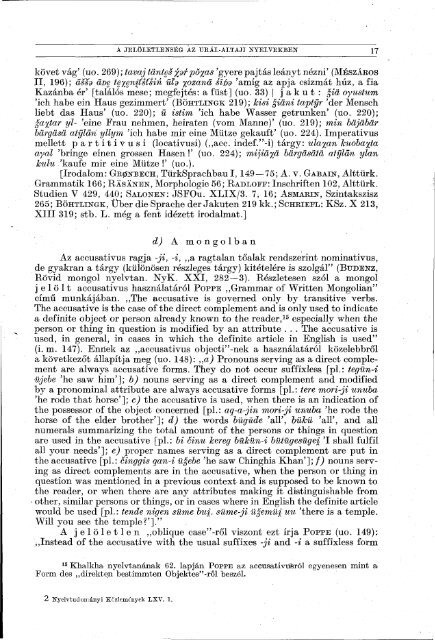
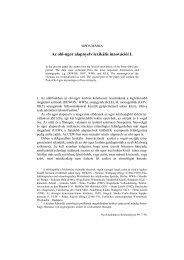
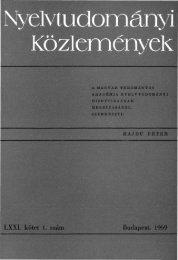
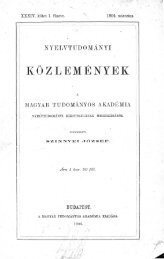
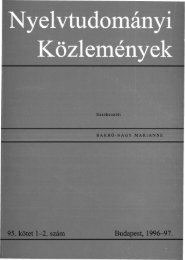
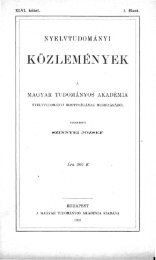
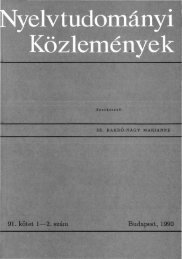
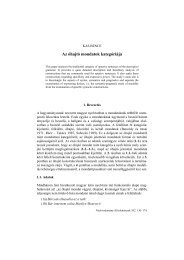
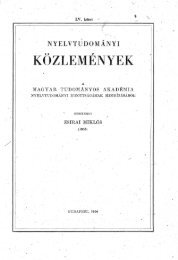
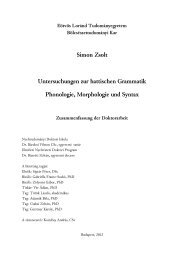
![Gósy Mária: A [p, t, k] mássalhangzók zöngekezdési ideje Bevezetés ...](https://img.yumpu.com/15682849/1/190x245/gosy-maria-a-p-t-k-massalhangzok-zongekezdesi-ideje-bevezetes-.jpg?quality=85)
